A Nation’s Trouble Upon A Lone Ranger
Oct 02, 2018
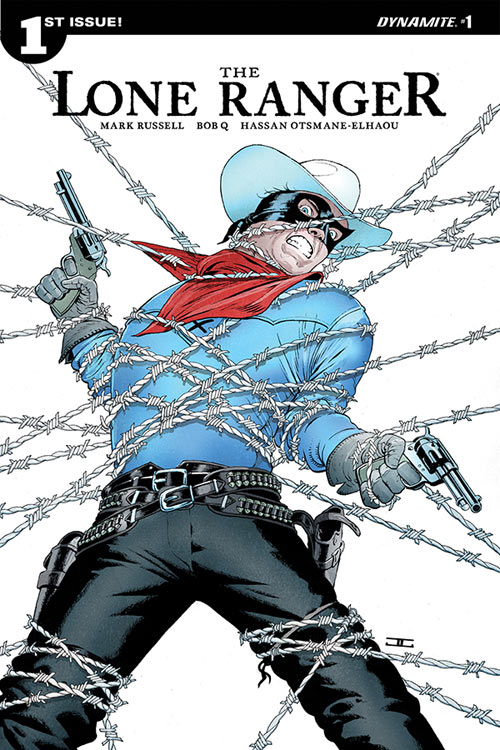 |
by Vince Brusio
Wild stallions are meant to run free. So what happens when you try to make them wear a saddle? The same could be said about what happened to people who used to roam freely about the Wild West but then found themselves encumbered by barbed wire. This changing landscape and a new way of life come into the view of Mark Russell’s The Lone Ranger #1 (AUG181142) for Dynamite Entertainment. The book hits a comic shop near you on October 3rd, but you get to read now what writer Mark Russell thinks about his stories set in the West, and how they’re a mirror for today’s political landscape.
The Lone Ranger #1 (AUG181142) is in comic shops October 3.
*********
Vince Brusio: Western comics aren’t exactly encroaching upon superhero titles at the comics shop. So to take point on a Western comic like The Lone Ranger #1 (AUG181142) means you’ve got a pretty vested interest in this kind of storytelling, which also implies a deep appreciation for stories from yesteryear. Tell us a little about what drew you to Western comics. What is it about the period or the mentality of the characters that makes you want to play in those dusty desert plains?
Mark Russell: Well, two things really. One, I love westerns. Spaghetti westerns in particular. Secondly, westerns have long been the sort of mythological shorthand for how we perceive and understand America. The matinee westerns of the 1950s were the sort of righteous white-hat morality tales about right making might. They were the way a nation who'd just vanquished the Nazis and were squaring off against the Soviets felt about itself. Of course, the view gets a little more morally complicated when you look in from the outside, so the European "spaghetti" westerns of the 1960s were more skeptical of the western hero, he was usually a bounty hunter, or a hired gun working for money, or at best revenge. This was, in no small part, due to the uneasiness with which they saw the United States riding into town promising to be their savior, knowing that the odds were just as good that this gunman was going to get them all killed in a nuclear war. I think the western is especially relevant now given how much our nation has changed in just a few years and how dangerous its divisions have become. My story is set at the advent of barbed wire, because I wanted it to reflect what I think is happening to America, namely, that these fences are being used to divide us so a few wealthy ranchers can grab it all and ensure that the only people left standing are working on their ranch.
Vince Brusio: The Lone Ranger doesn’t need an introduction. Most people know about Silver and Tonto as well. The Lone Ranger as a symbol, though, as a concept, could be open to many different scholarly interpretations given this particular period of history for the United States. So if you had to look at the Lone Ranger and compare him to other Western heroes like Wyatt Earp, or Western movie roles like John Wayne’s Rooster Cogburn, how would he compare to those titans, and why do you think his name and image is more recognizable than both?
Mark Russell: In a lot of ways, I think the Lone Ranger is the perfect uncomplicated reflection of how our nation saw itself in a simpler time. A man devoted entirely to justice, who never shoots but in self-defense, and even then, not to kill, but only to end the threat facing him. So, I think he resonates a little more with the American cultural imagination than those more complicated heroes who were beloved, but mostly known for merely settling grudges or using their guns to make a buck.
Vince Brusio: Much like impending doom can come hurtling at Earth in form of a comet or space invasion, disastrous consequences befall people in your first issue when they resist new borders because of the advent of barbed wire. In your opinion, did barbed wire do just as much to change the landscape of the West as, say, the advent of the locomotive? Is this realization something that weighs heavy on the mind of the Lone Ranger? In what way?
Mark Russell: The west was forever changed — some would say destroyed — by three inventions. The telegraph, the railroad, and barbed wire. The first two tied the people, land, and resources of the west to the big money interests and power brokers on the east coast. They could now establish and command an empire stretching thousands of miles almost as easily as they could their holdings in New York or Virginia. But the one that perhaps most fundamentally changed the way of life in the west was barbed wire. Allowing people to fence off enormous tracts of land cheaply drove the old open range cowboys, the cowboys of our popular imagination, out of business. It also made the economic life of the west utterly incompatible with nomadic tribes of Native Americans, who wandered the plains in ancient migratory patterns to follow the buffalo. Barbed wire forced the west to stay put and get a menial job, or even worse, herd the remaining free native tribes onto reservations.
Vince Brusio: A few panels of Bob Q’s artwork are shown for the news series in the August issue of the PREVIEWS catalog. To say that it’s kinetic would be an understatement. The panels are very energetic. That same kind of electricity is felt just by looking at the main cover for the book, in which The Lone Ranger is struggling under the cutting teeth of barbed wire wrapped around his face, arms, legs, and torso. Is this indicative of the tone of your story? Are you consciously writing so that we can feel the ground shake when forces collide to take the high ground?
Mark Russell: I try to always write comics that respect the fact that this is a visual medium. Don't tell what you can show. I wanted this first and foremost to be an action-packed and occasionally funny western. If I just wanted to write a diatribe about the west as a metaphor for America, I could have just written an essay and buried it in some journal. I'm writing a comic book so I can make my point while showing guys getting kicked by a horse or knife-dueling a cannibalistic bounty hunter.
Vince Brusio: What does The Lone Ranger offer new readers who are looking for something different at the comic shop?
Mark Russell: I like superheroes. Superheroes are great. That said, they are mostly about the power fantasies of children. And I don't say that dismissively. Superheroes provide the missing variable that let young readers ask themselves, "How would I change the world if I had the power?" And that's an important question to ask. But the Lone Ranger is the power fantasy of an entire nation. It allows us to ask, what should America stand for if it wears the white hat and claims to be on the side of justice?" Given the turmoil of our times and the crisis in our national identity, I think it is a critical moment in time for us to ask that question.
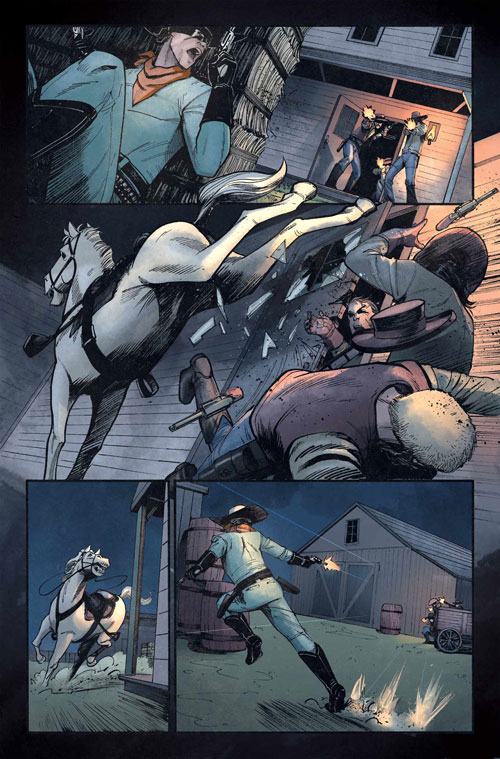 |
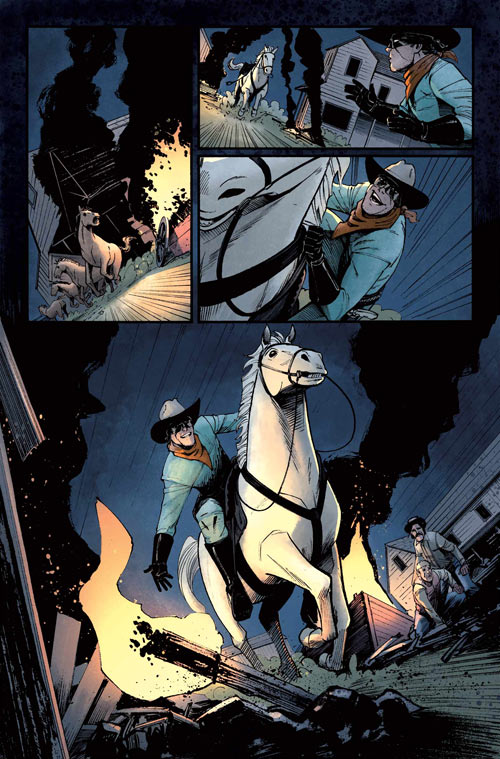 |
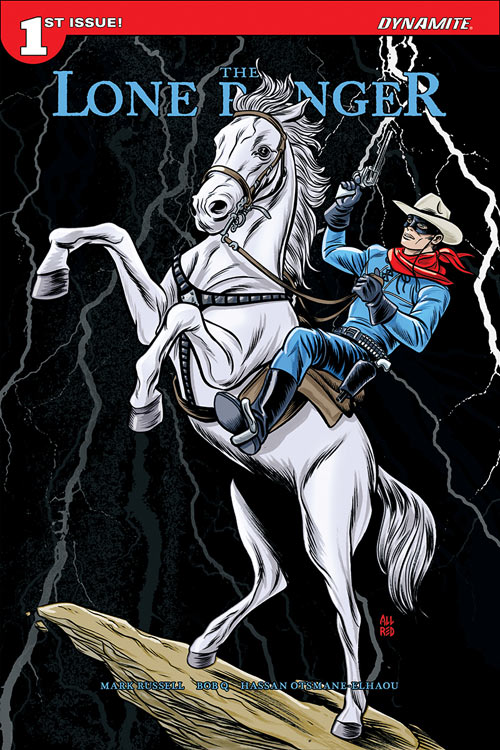 |
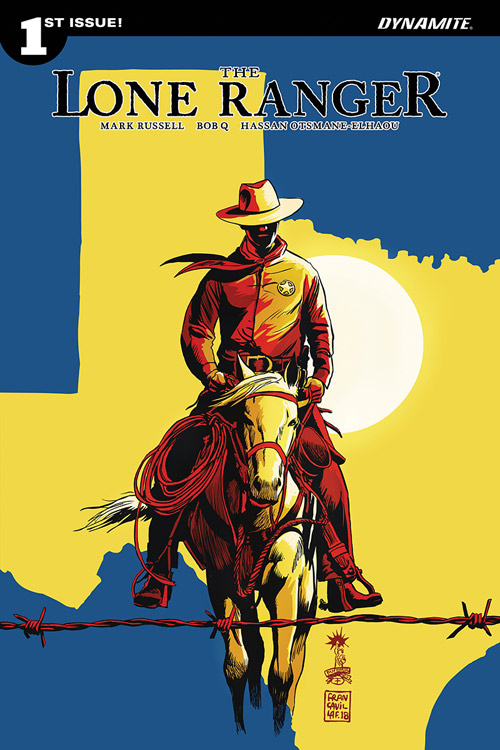 |
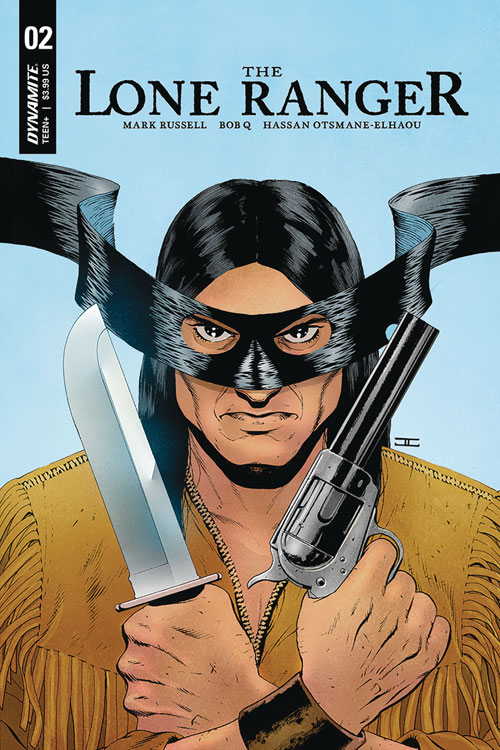 |
**********
Vince Brusio writes about comics, and writes comics. He is the long-serving Editor of PREVIEWSworld.com, the creator of PUSSYCATS, and encourages everyone to keep the faith...and keep reading comics.




